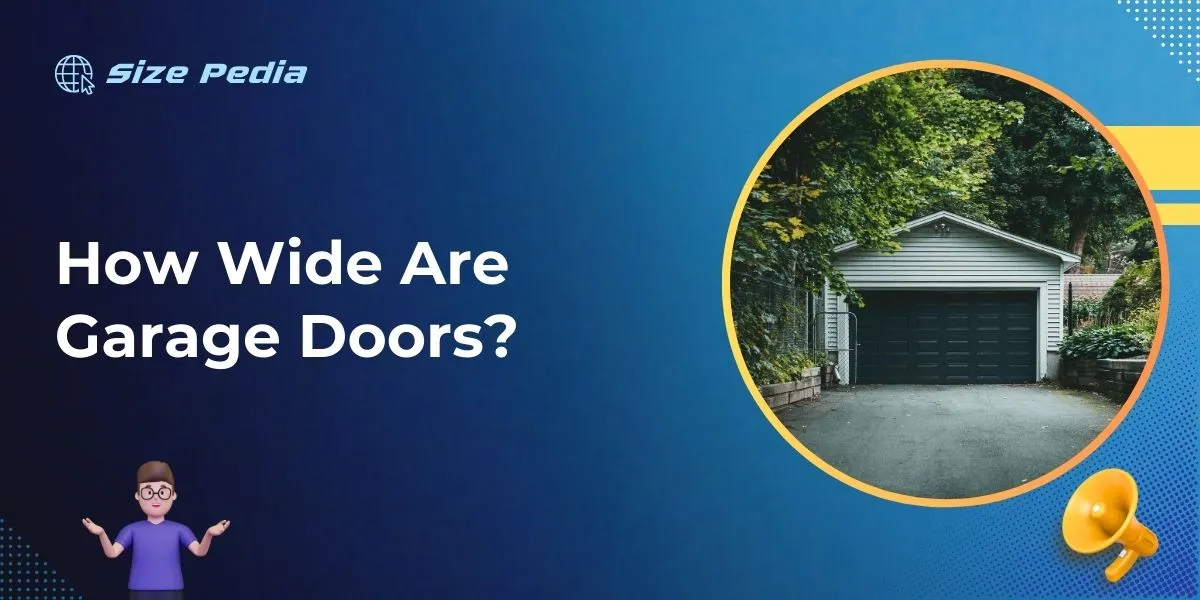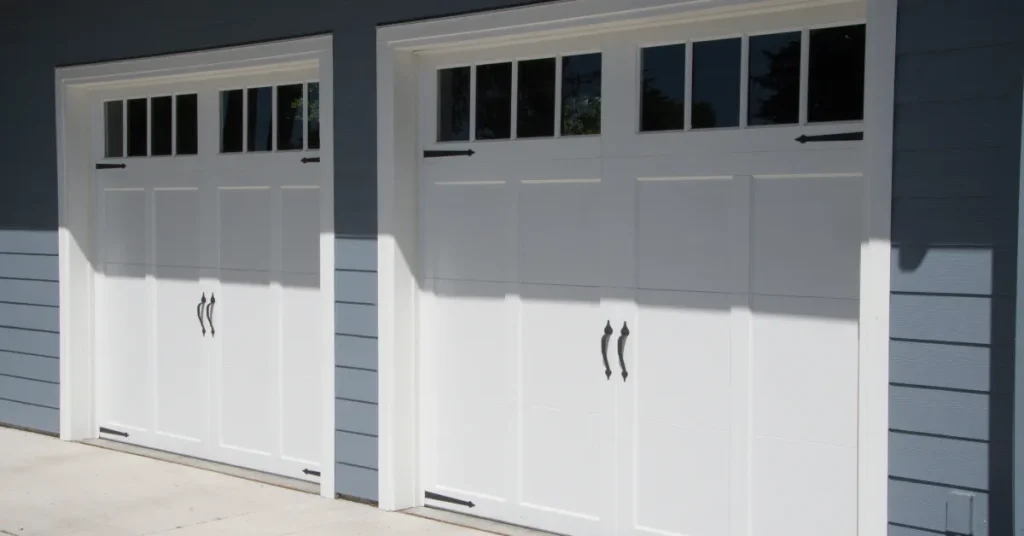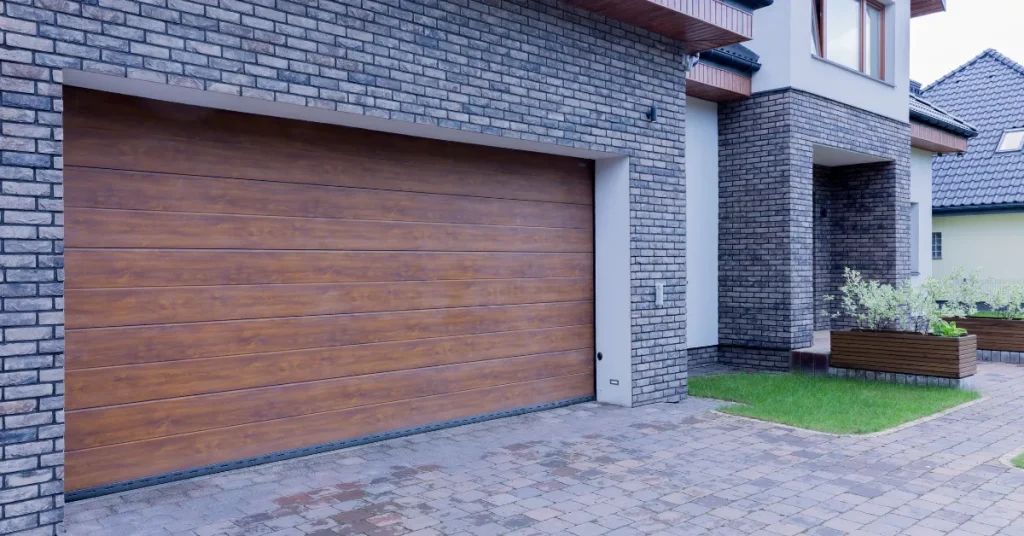Standard garage doors are typically 7 to 8 feet wide for single-car garages, and 16 feet for double-car garages. Custom sizes can vary considerably depending on homeowner needs and space constraints.
Selecting the right garage door size is critical for both aesthetics and function. Homeowners need to ensure their garage doors accommodate their vehicles comfortably while also complementing the architectural style of their homes.
Garage doors come in a range of standard sizes to meet the diverse requirements of residential properties.
Whether you’re building a new home or upgrading an existing garage, understanding the common widths available helps streamline your choice. Keep in mind that while standard sizes fit most homeowners, custom dimensions can be crafted to fit unique spaces.
This knowledge is not only practical for potential buyers or renovators but also essential for anyone involved in garage design or construction.

Garage Door Sizes At A Glance
Choosing the right garage door size is crucial for your home’s functionality. Whether it’s a single or a double garage door, understanding the standard dimensions will help assure the best fit. Let’s take a closer look at the typical sizes available.
Standard Measurements For Single Doors
Single garage doors are ideal for homes with limited space. They provide ample room for one vehicle. The sizes are:
- Width: Usually 8 to 10 feet.
- Height: Commonly 7 to 8 feet.
Note: Custom sizes are available if these don’t fit your needs.
Typical Dimensions For Double Garage Doors
Double garage doors comfortably accommodate two vehicles side by side. Here is a quick snapshot of the standard sizes:
| Width | Height |
| 12 to 16 feet | 7 to 8 feet |
Like single doors, double garage doors can be customized to different measurements.
Factors Influencing Garage Door Size
Choosing the right garage door size is more complex than it seems. The size can affect both functionality and aesthetic appeal. Here are key factors that determine the proper dimension for your garage door.
Vehicle Types And Sizes
- Standard cars typically fit within single doors, measuring 8 to 9 feet wide.
- Larger vehicles like SUVs might need up to 10 feet of width.
- Trucks or vans require even wider doors, potentially up to 12 feet for comfort.
Analyze your household’s fleet when deciding on the door size to ensure ample space for safe entry and exit.
Space Considerations Within The Garage
Interior space dictates the size of the garage door too. Consider these points:
| Interior Element | Consideration for Door Size |
| Storage Space | Avoid wider doors if space is for storage. |
| Workbench Area | Ensure the door allows room for a work area. |
| Additional Equipment | Larger door may be needed if storing big items. |
Plan for the door to align with the garage’s internal layout, allowing for free movement and organization.
Custom Garage Door Sizing

Garage doors come in varying sizes. Standard dimensions fit most homes. But, unique homes need special doors.
Custom garage door sizing caters to your specific needs.
It ensures a perfect fit and adds a personal touch. Whether it’s for extra height, width, or a non-standard shape, customization is the solution.
When To Opt For Customization
Unique home designs often require custom solutions. Here’s why you might choose custom garage doors:
- Non-standard openings: Not all garage openings match standard sizes. Custom doors fill the gap.
- Vintage or special architecture: Preserving a home’s original charm might need a garage door that’s not off-the-shelf.
- Functional needs: RVs or boats may need taller or wider doors than typical cars.
Planning For Custom Doors: What To Consider
The planning stage is crucial for custom garage door success. Here’s what to think about:
- Measurements:
Accurate dimensions are a must. Height, width, and depth dictate the design. - Material Choice:
Wood, steel, or fiberglass? Material affects look, durability, and price. - Style & Aesthetics:
The door should complement the house. Choose a proper color and texture. - Insulation:
Effective thermal insulation saves energy. Decide on the right level for your climate. - Opener Compatibility:
Ensure the door works with existing or new openers. - Local Regulations:
Check building codes. They may influence design choices.
Consult a professional for the best outcome. With the right expertise, your custom garage door can be functional and stylish.
Updating Your Garage Door
Imagine a garage door that fits your needs perfectly. A well-considered update can transform your garage. The right door width enhances functionality and aesthetics. This article sheds light on why and how sizes may change, focusing on standard garage doors.
Reasons For Size Adjustments
Each home has unique demands for garage spaces. Here are several reasons for altering door sizes:
- New vehicle sizes: Bigger cars need wider entries.
- Storage needs: More width provides extra storage room.
- Accessibility: Wider doors ease mobility for larger items.
- Modernization: Updates can refresh your home’s look.
The Process Of Expanding Or Reducing Door Size
Changing your garage door size involves several steps:
- Assess the current space and structural limitations.
- Consult with professionals for appropriate measurements.
- Choose a new door that complements your home.
- Prepare for construction, which might affect the surrounding areas.
- Installation of the new door by a skilled team.
Take note that the process might call for building permits. Always check local regulations.
Choosing The Right Door For Your Garage

When deciding on a new garage door, the width isn’t the only important factor. The right garage door can enhance your home’s appearance, improve energy efficiency, and boost property value.
Consider material and style, insulation qualities, and the potential impact on your home’s marketability.
Material And Style Implications
Selecting the perfect material and style for your garage door can transform the look of your home. Different materials offer unique benefits:
- Steel: Durable and easy to maintain.
- Wood: Classic appearance and natural beauty.
- Aluminum: Lightweight and rust-resistant.
- Fiberglass or Vinyl: Resists dents and breakage.
Style choices range from traditional panel designs to modern glass and aluminum. Match the door style to your home’s architecture for added curb appeal.
Insulation And Energy Efficiency
A well-insulated garage door keeps your garage warmer in winter and cooler in summer. An insulated door can lead to energy savings by maintaining a steady temperature. This table illustrates the differences:
| Insulation Type | Benefits |
| Polyurethane Foam | Higher R-value, better insulation |
| Polystyrene Panels | Lightweight, lower cost |
Considering the climate you live in will guide your insulation choice. Energy-efficient doors can reduce heating and cooling expenses for your whole house.
Impact On Property Value
Garage door upgrades often yield a return on investment when you sell your home. A new door can:
- Increase curb appeal with a fresh, modern look.
- Improve home security and attract buyers.
- Enhance the home’s energy efficiency, a key selling point.
Choose a door that complements your home and meets potential buyer expectations to maximize resale value.
FAQs About How Wide Are Garage Doors
What Is The Standard Width Of A Garage Door?
The standard width of a garage door typically ranges from 8 to 16 feet. Eight to nine-foot doors are common for single-car garages, while double-car garages usually measure 16 feet wide.
Is 8 Feet Wide Enough For A Garage Door?
An 8 feet wide garage door is generally sufficient for a single vehicle, offering adequate clearance for entry and exit.
Can A Garage Door Be 20 Wide?
Yes, a garage door can be 20 feet wide, designed to accommodate larger vehicles or multiple cars.
What Size Garage Door For A Full Size Truck?
A full-size truck typically requires a garage door that is 9 to 10 feet wide and 8 feet tall. Ensure you measure your truck’s width and height for the best fit.
Conclusion
Understanding garage door widths is crucial for optimal functionality and aesthetic appeal.
Standard sizes cater to most vehicles, but custom options are available for unique needs. As homeowners prioritize convenience and style, selecting the right garage door width becomes an essential part of home design.
Remember to measure accurately and consult with professionals for the best fit for your space.
Resources:
1. https://basc.pnnl.gov/resource-guides/garage-doors-are-pressure-rated
